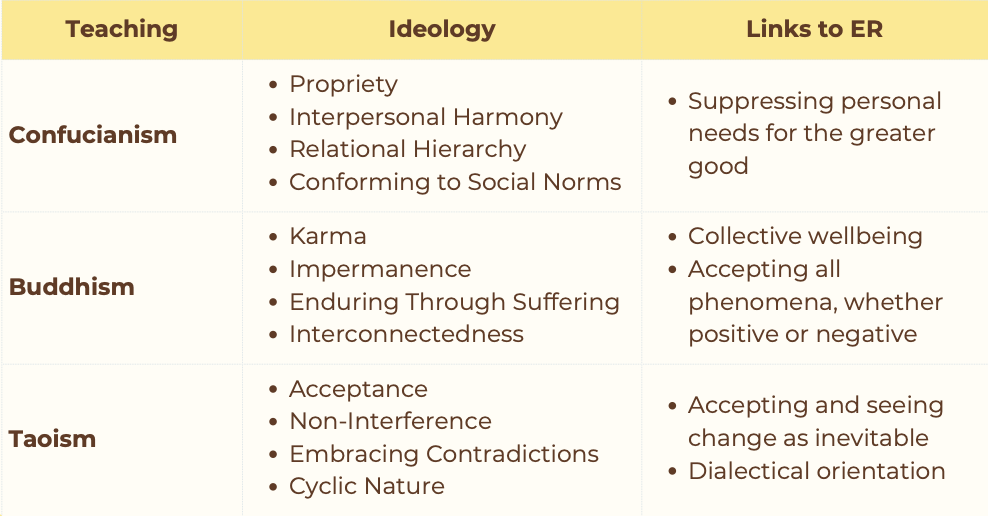Reflections from our November Community of Practice session
Nov 06, 2025
At Shapes and Sounds we acknowledge the importance of accessing up-to-date scientific evidence in the delivery of evidence-based mental health care. As such, we bring together Asian mental health practitioners each quarter in our Community of Practice (formerly Connect and Grow) - a professional development program where we collaboratively reflect and discuss the practical relevance of recent literature surrounding the mental health of Asian populations within Australia.
What did we discuss in our session?
For our final session of 2025, Marcus discussed his recent publication with the Culture, Trauma and Mental Health group at Monash University (and Asami!) titled: Considering Confucian, Buddhist, and Taoist Influences on Emotion Regulation and Daily Affect in Chinese Australian Trauma Survivors.
Confucianism, Buddhism, and Taoism, otherwise known as the Three Teachings of East Asia, are widely influential in Asian communities worldwide. Broadly, they highlight the importance of:
- Accepting and enduring through suffering and adversity
- Embracing change and contradictions
- Viewing everything in life as relationally bound and interconnected
- Maintaining social harmony and abiding by social norms

Though there is emerging recognition of how culture can influence emotion regulation, both in non-clinical and also clinical trauma-exposed populations, there has been limited acknowledgement of the role which the Three Teachings of East Asia may play in emotion regulation following trauma exposure. This is despite compelling links between ideologies within the Three Teachings of East Asia and different emotion regulation (ER) strategies (see above).
Within this study, Lai et al. (2025) found that Taoism predicted greater use of acceptance, and Buddhism predicted greater use of interpersonal emotion regulation strategies.
Importantly, those with stronger endorsement of Taoist ideologies were able to derive greater positive moods when using acceptance, compared to those with lower levels of Taoism endorsement. This relationship seemed to also hold true for interpersonal emotion regulation strategies and more positive moods/less negative moods.
These findings provide preliminary evidence that the Three Teachings of East Asia may play a positive role for post-trauma adjustment within Chinese Australian trauma survivors.
Key discussion themes and practitioner reflections
- Practitioner discussed the difficulties and limitations of practicing within a Western psychological framework. One practitioner described how the desire to value other's happiness over one's own feels challenging at times, as Western psychological frameworks are heavily focused upon the individual and one's own wellbeing. This led to broader questions and discussions surrounding differences in how Western/Individualistic and Eastern/Collectivistic cultures differ in their conceptualisation of wellbeing. Whilst Western cultures emphasise happiness in individual wellbeing, perhaps wellbeing in collectivistic cultures may manifest as peace of mind, peace and harmony within the community, and feeling content. These may be achieved at the cost of individual 'happiness', but nonetheless should not be considered as maladaptive to their mental health. Moving beyond rigid understandings of what 'ideal' mental health looks like across cultures may help to build greater reflexivity and humility in therapeutic practice. Working with clients to develop individualised definitions of wellbeing that are most congruent to their cultural values, and also learning to view wellbeing through a family/social lens, is crucial.
- Practitioners also reflected upon the fact that though many had not formally learnt about the Three Teachings of East Asia in school/at home, these ideologies were influential nonetheless. This speaks to the omnipresent nature and subtle influence of these ideologies in East Asian cultures, in that they are virtually ingrained in all aspects of their lives.
- Despite being able to resonate with these ideologies and recognise their widespread impact, practitioners noted that they received no formal training on these during their studies. One practitioner mentioned how when working with oncology patients/in palliative care, their studies offered a strong clinical lens on how to approach these situations, yet they were not equipped with the skills to approach concepts relating to death through a cultural lens. Given these teachings offer insight into how adversity and hardship should be viewed, recognising them within clients may help to improve therapeutic rapport and bolster culturally responsive practice.
- Finally, practitioners reflected on other nuances to be further explored within the relationship between trauma, the Three Teachings of East Asia, and emotion regulation. For example, practitioners highlighted potential differences across generations, in metropolitan vs rural communities, and also in native vs migrated East Asian communities.
~
Shapes and Sounds is home to the largest Community of Practice for Asian mental health professionals in Australia and we meet quarterly to discuss papers as summarised above. Stay tuned our on website here and our socials to receive updates on our Community of Practice sessions for 2026.
Alternatively, if you're interested in connecting with Shapes and Sounds through our cultural-competency trainings, you can learn more about our trainings here.
💡For community members:
We created the "Essential Guide for Asian Australian Mental Health" by surveying over 350 Asian Australians during Covid-19 lockdowns.
Download our guide and learn about the three most pertinent areas of concern for the Asian community, with tips and strategies to support you through.
🤝For mental health service providers:
Shapes and Sounds supports mental health organisations and teams to feel confident and resourced in providing culturally-responsive care to the Asian community in Australia.
Download our information pack to learn more.
